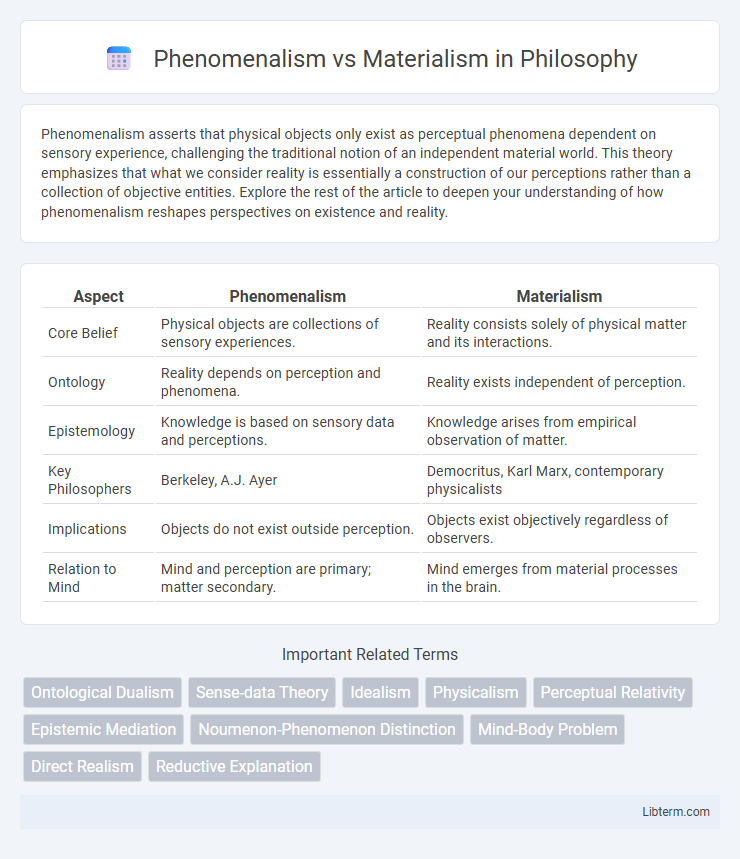Phenomenalism asserts that physical objects only exist as perceptual phenomena dependent on sensory experience, challenging the traditional notion of an independent material world. This theory emphasizes that what we consider reality is essentially a construction of our perceptions rather than a collection of objective entities. Explore the rest of the article to deepen your understanding of how phenomenalism reshapes perspectives on existence and reality.
Table of Comparison
| Aspect | Phenomenalism | Materialism |
|---|---|---|
| Core Belief | Physical objects are collections of sensory experiences. | Reality consists solely of physical matter and its interactions. |
| Ontology | Reality depends on perception and phenomena. | Reality exists independent of perception. |
| Epistemology | Knowledge is based on sensory data and perceptions. | Knowledge arises from empirical observation of matter. |
| Key Philosophers | Berkeley, A.J. Ayer | Democritus, Karl Marx, contemporary physicalists |
| Implications | Objects do not exist outside perception. | Objects exist objectively regardless of observers. |
| Relation to Mind | Mind and perception are primary; matter secondary. | Mind emerges from material processes in the brain. |
Introduction to Phenomenalism and Materialism
Phenomenalism asserts that physical objects and events are reducible to sensory experiences and perceptions, emphasizing that reality consists primarily of phenomena as they appear to observers. Materialism, in contrast, holds that matter and physical substances constitute the fundamental reality, independent of perception or consciousness. These contrasting views shape debates in metaphysics, ontology, and epistemology concerning the nature of existence and the role of observation in defining reality.
Historical Background of Both Philosophies
Phenomenalism emerged in the early 19th century, rooted in the works of George Berkeley and later refined by philosophers like John Stuart Mill, emphasizing that physical objects are perceptual phenomena dependent on sensory experiences. Materialism traces back to ancient Greek atomists like Democritus and Epicurus, asserting that matter is the fundamental substance in nature and all phenomena, including consciousness, arise from material interactions. The historical evolution of phenomenalism challenges materialist assumptions by prioritizing perception, while materialism maintains a consistent focus on physical reality as the basis of existence.
Core Principles of Phenomenalism
Phenomenalism posits that physical objects do not exist independently of sensory experiences, asserting that objects are logical constructions of perceptual phenomena. Core principles of phenomenalism emphasize that knowledge of the external world is grounded in direct or possible sensations, making sensory data the fundamental reality. This view contrasts sharply with materialism, which holds that matter exists independently and mental states are contingent upon physical processes.
Core Principles of Materialism
Materialism asserts that physical matter is the fundamental substance of reality, with all phenomena, including consciousness, arising from material interactions. It emphasizes the primacy of the tangible, observable universe, rejecting non-material or spiritual explanations. Core principles include the belief that matter exists independently of perception and that all events and processes are determined by material conditions.
Differences in Epistemology
Phenomenalism posits that knowledge is fundamentally based on sensory experiences and the perception of phenomena, asserting that objects only exist as sensory impressions. Materialism, conversely, holds that knowledge derives from the physical, mind-independent reality that exists regardless of observation. The epistemological difference lies in phenomenalism treating perception as the foundation of reality, whereas materialism emphasizes objective material entities as the source of knowledge.
Ontological Commitments Compared
Phenomenalism posits that physical objects are reducible to sensory experiences, committing ontologically only to phenomena and mental states, whereas materialism asserts the existence of matter as an independent reality beyond perception. The ontological commitments of phenomenalism are limited to perceptual events and experiences, rejecting the notion of mind-independent objects, while materialism's commitments encompass physical substances and causal laws governing matter. This contrast highlights phenomenalism's reliance on epistemic frameworks versus materialism's grounding in objective, mind-independent entities.
Implications for Science and Reality
Phenomenalism asserts that physical objects are constructions of sensory experiences, challenging the objective existence of matter and thus reshaping scientific inquiry toward perception-based models. Materialism posits that matter is the fundamental substance, grounding scientific investigation in measurable, empirical phenomena and enabling the development of consistent physical laws. The philosophical distinction impacts the interpretation of scientific data, with phenomenalism emphasizing the role of observation and consciousness while materialism focuses on an independent, observer-free reality.
Key Philosophers and Influential Works
Phenomenalism, championed by George Berkeley in "A Treatise Concerning the Principles of Human Knowledge," asserts that objects only exist as sensory phenomena perceived by the mind. In contrast, Materialism, with foundational contributions from Thomas Hobbes in "Leviathan" and later Karl Marx's "Capital," holds that matter is the fundamental substance of reality, independent of perception. These key philosophers shaped metaphysical debates by emphasizing either perception's role in existence or the primacy of physical matter.
Criticisms and Debates Surrounding Each View
Phenomenalism faces criticism for its reliance on sensory perceptions, which some argue cannot fully account for the existence of an objective reality independent of observers. Materialism is often challenged for its reductionist approach, which critics claim oversimplifies consciousness and subjective experience by explaining them solely through physical matter. Debates between the two perspectives revolve around the nature of reality, with phenomenalists emphasizing perceptual experience and materialists insisting on a tangible, mind-independent world.
Conclusion: Contemporary Relevance and Future Directions
Phenomenalism emphasizes perception as the basis of reality, highlighting the centrality of sensory experience, while materialism asserts the primacy of physical matter independent of observation. Contemporary discourse integrates these views to address challenges in quantum mechanics and consciousness studies, suggesting hybrid models that consider both experiential phenomena and underlying physical substrates. Future directions point towards interdisciplinary research combining philosophy, neuroscience, and physics to develop a more coherent ontology that bridges subjective experience with objective reality.
Phenomenalism Infographic

 libterm.com
libterm.com